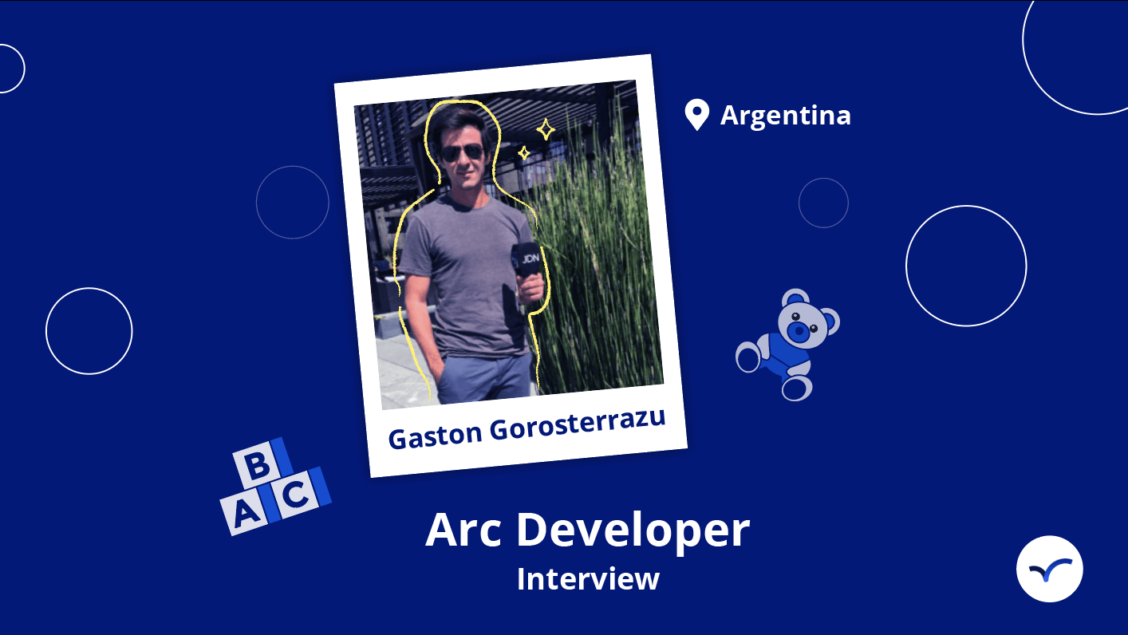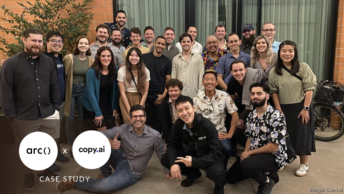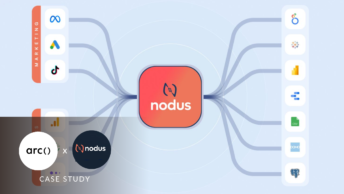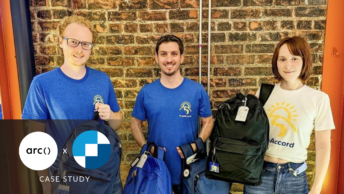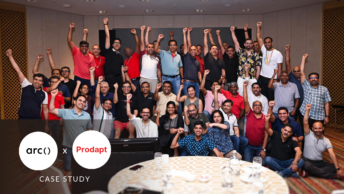In this Arc Developer interview, we chat with Gaston Gorosterrazu about the benefits of a 30-second commute, why communication skills are so important when working remotely, and why you need to “be in people’s faces.”
Looking for top talent fast? See how Arc can help you:
⚡️ Find developers, designers, marketers, and more
⚡️ Freelance or full-time remote + fully vetted
⚡️ Save up to 80% with global hires
Hire top talent with Arc risk-free →
How did you start your career?
I started very young, programming small systems for clients at the computer store I worked as a technician. When I wasn’t working, I was also developing stuff for fun.
I guess I’m one of those lucky individuals that discover what they want to do early. In my case, I was eight; and as my family was very poor, I was only able to buy my first computer four years later.
Why did you choose to specialize in front-end instead of back-end languages?
Because it was hard for me, therefore: fun! The back-end needs knowledge, and then once you have this knowledge, you can do it almost without thinking. The front-end is more about choices, interacting with non-technical stakeholders, and dealing with an ample set of combined technologies.
Read More: Tomas Radvansky on His Career Journey from MD to Remote Developer
Do you have any regrets? If so, what are they?
On choosing front-end? No. I’m happy in the place I am.
How is working remotely different from working on-site?
30-second commute! Haha, It changes everything and requires training. When the place you live is the same place where you work, without boundaries it is easy to fall into either overwork or underwork.
When I started, remote work wasn’t even a thing; a few years ago it was “the future”, and now that future is upon us. I foresee that in the mid-term, most companies will accept and embrace it.
What do you love most about working remotely?
Did I mention the commute? What I love about working remotely is that I can choose when to be extremely efficient in my work so I can spend extra time with my family, or just work as usual.
What is the biggest challenge you face while working remotely?
The biggest challenge when working remotely is being really accepted as part of the team. Many companies tend to hire remotely to cover second-tier needs. I think that’s the challenge for every company thinking about hiring remotely.
Read More: Equipboard: Connecting Musicians & Instrument Brands With Arc’s Help
How do you communicate with your teammates as a remote developer?
In my case, over-communicate and be present all the time.
What are your favorite technologies or tools for remote work, and why?
I’m more of a people person. I’ve seen so many technologies come and go that I’ve reached the point where I understand the tool will change, but effective communication is key.
Being able to read the other person by whatever channel of communication you have available is the sharpest tool I’ve got in my drawer.
What objects, tools, and peripherals do you love to use while working remotely?
There’s just me and my Mac.
Read More: Bridging the Gap Between Blue-Collar Workers and Tech with Arc
What is the first software/application you ever built?
A catalog software for a local community library; I made it in GW-BASIC for a 2.5MHz computer. No database, no fancy stuff.
What are the most exciting projects that you’ve worked on?
B2Agro. A client-server system built on Javascript, HTML, PHP, and MySQL back in 1999. It would work with an encapsulated IE4 application that would auto-update, work-offline, and sync with the server whenever there was a connection available. This is all before the Gmail era, so nobody used Javascript for applications.
I would love to mention Aptugo as well! A RAD system that builds applications in any programming language, any device, and hundreds of times faster than traditional programming — it doesn’t get more exciting than that, for sure!
How did you evolve from a junior developer to a CTO?
No taking any shortcuts. My passion is to develop stuff, so there was natural growth on the technical side. I’m also good with people, plus I’ve a broad view thanks to many years of experience.
Read More: Good Developers Don’t Always Make Good *Freelance* Developers
How do you work with your team members as a CTO?
There’s no magic. Scrum meetings, sprints. Everything is laid out.
How do you inspire your team members and keep them motivated?
Funny thing is, most companies try to “motivate” their teams by making a set of rules for that. The truth is that everyone is motivated on the first day of work, and then they start losing motivation because of those rules. E.g., a “casual Friday” just exposes that they’re telling you what to wear the other four days of the week.
Every individual finds motivation in different ways; just ask! Then keep asking. Respect the individual as an individual, and you’re set.
How do you build your team culture?
Hiring is one of the most important factors. I’ve rejected excellent technicians that would break culture while accepting some individuals mostly for their cultural fit (knowing skills can be developed.)
Read More: How to Create a Remote Work Culture That’s Supportive, Positive & Fun
Which personality traits do you look for when recruiting new team members?
As with motivation: no rule here. Everyone has something, and as a manager, my job is to discover it. A 9-to-5er can help bring diversity to a team full of workaholics and benefit the team in the mid-term.
I reckon it would be easier to look for personality traits that get along with my preferences, but I’m not the kind of person that looks for easy.
How do you balance your life when it comes to work, family, and leisure?
Perfectly! When my first daughter was born, I would work as a manager, which meant that sometimes I would leave for work and return a few days after, missing a lot of “first times” (her first words, first walk, etc.).
So I switched to working remotely. Now I can take a break during the day and go and play with them, or plan a trip. I’ve visited five different countries in 2019!
How do you stay up-to-date with technologies and best practices?
I dedicate at least one hour every day to reading. I seek out emerging technologies, get involved in what DevOps is doing, etc. It is easy if you’re not a TV fan!
Read More: How to Create a Software Development Workflow for Freelance Hires
What is the best advice you’ve ever received?
While he said it in another context, Dereck Goodwin once told me: “Be in their faces.” I think that’s the best advice a remote developer can get.
What advice would you give to a developer wanting to make the leap to remote?
It is going to happen, so, the earlier you make the jump into it, the better. Then prepare a place for you to work, and respect your own schedule. If you play with your phone, set times for it. If you smoke, take smoke breaks just like at the office. Set a good schedule and get used to complying with it.
What would you do if you didn’t have to work for money?
Most probably exactly the same thing I’m doing now. My last month involved (besides programming) greeting a CEO at the airport, searching for new office space, talking with lawyers, interviewing people, and meeting a high-profile individual.
I have built this over the last 25 years, I’m exactly at the point I wanted to be, and I know this isn’t the point I will be in 5 years. For me, that’s my motivation; money is just to pay bills.
Thanks for chatting with us, Gaston!
If you’re interested in becoming a remote developer with Arc, click here.
And, if you’re looking for the best devs to hire:
You can also try Arc, your shortcut to the world’s best remote talent:
⚡️ Access 450,000 top developers, designers, and marketers
⚡️ Vetted and ready to interview
⚡️ Freelance or full-time


